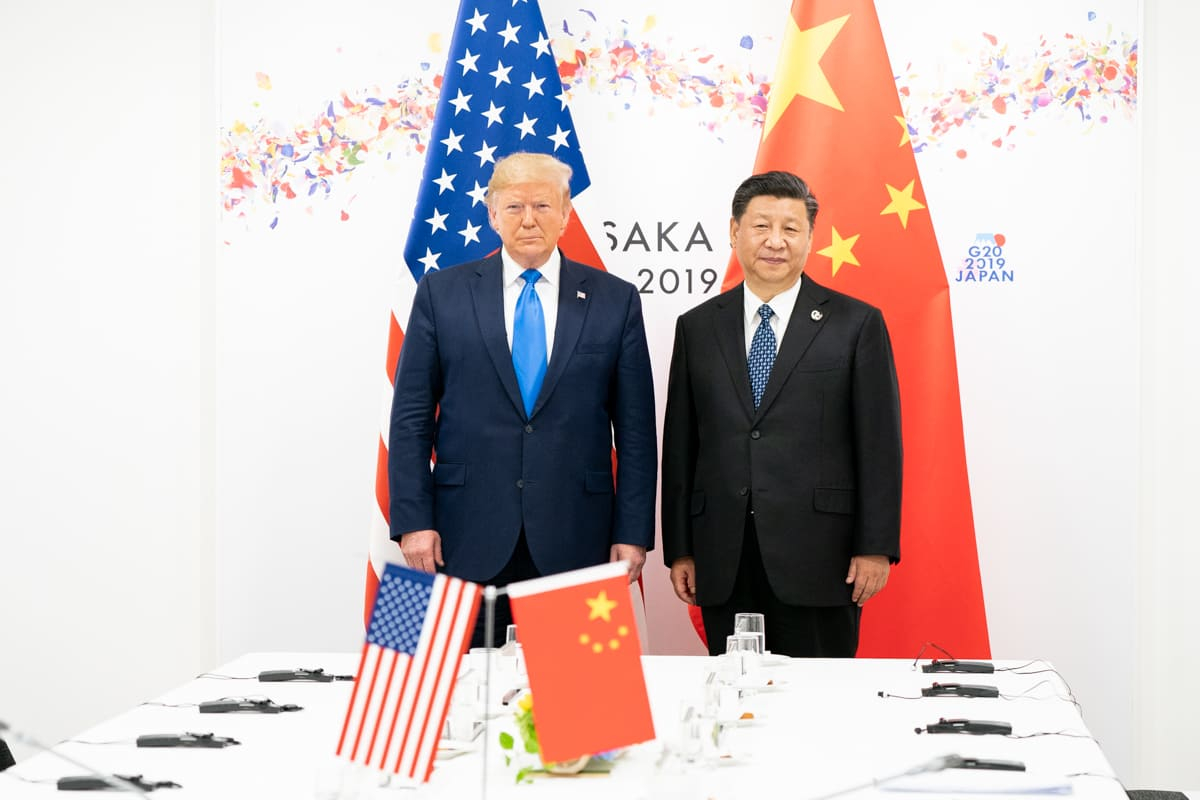This article is also available in Italian / Questo articolo è disponibile anche in italiano
While Donald Trump's victory has been all too clear and straightforward, and even the reasons for it now appear quite obvious, what is decidedly less clear is how China feels about it. For the entire period of the U.S. election campaign, the official Chinese media not only never took a stand for either side, but did not even give much weight to the election that instead kept the rest of the world with bated breath.
Yet, the elusive President Xi Jinping did not wait days this time, as he did four years ago, to call his newly elected U.S. colleague: as early as Wednesday, November 6, he reportedly made the fateful phone call, as CNN reported. That there is some concern about the U.S. protectionist policies, that is the only certainty. But perhaps Xi, and China, may not mind a second Trump term so much.
Trump vs. Harris: who was China rooting for?
On Thursday morning, November 7, while international news outlets were posting non-stop updates on the day after the U.S. election, the homepage of Xinhua, China's state news agency, limited Xi Jinping's congratulatory letter to Donald Trump to a small headline low on the left column.
Instead, ample space was given to a – surely unmissable – conference on classical culture that had just opened in Beijing, and to Xi's institutional visit to Hubei province. A behavior that seems to us at the very least unusual but is actually “quite normal for the Chinese media,” Simone Pieranni, among Italy's leading China experts, author of the podcast Altri Orienti and the very recent essay 2100. Come sarà l’Asia, come saremo noi (2100. How Asia will look like, how we will look like. Mondadori, 2024), explained to us over the phone. “Official Chinese newspapers generally do not give prominence to political elections in Western nations,” Pieranni says, “and they didn't give any in the weeks leading up to the vote either.”
As for the question that we all have been asking ourselves – namely, who were the Chinese rooting for? – Pieranni has no doubts: “They were not rooting for anyone because they know that in terms of the ongoing confrontation, both commercial and geopolitical, the situation will not change. The relationship between the United States and China is a complicated one, whoever is in the presidency, and the Chinese are aware of that.” In short, for the People's Republic, one (American) president is as good as the other.
Xi Jinping's congratulations to Donald Trump
Xi Jinping's ultra-timely phone call to the newly (re)elected U.S. president – as early as Wednesday, according to CNN, with the results still warm – is more unusual, however. For Joe Biden, four years ago, the Chinese congratulations had taken as long as eight days. So why such promptness this time?
The haste is only partly explained by the otherwise justified concern over the protectionist policies promised by Trump in the election campaign. “While they have some apprehension about his tariff and sanction policies,” Pieranni notes, “on the other hand, since Donald Trump is a businessman, they may feel that they have a chance to speak to him more clearly than a Democratic president, who would be more attentive to human rights issues. I think China, all things considered, does not see the Trump presidency so negatively. The Chinese generally prefer to move on familiar ground, and with Trump, there will presumably be movement on the ground of economics: he will put up tariffs, China will respond with more tariffs, and the matter will stop there, with no 'lessons' about the superiority of the American democratic system over the Chinese one. Trump certainly won't be going on about stuff like that…”
For the time being, in official congratulations published by Xinhua, President Xi Jinping reiterated the customary call to “find the right way to get along in the new era, so as to benefit both countries and the wider world.” He also goes on to observe how “History teaches that China and the United States gain from cooperation and lose from confrontation”, and expressing the hope that “the two sides will uphold the principles of mutual respect, peaceful coexistence and win-win cooperation, strengthen dialogue and communication, properly manage differences and expand mutually beneficial cooperation”.
One certainty: more tariffs will roll in for China
While the official Chinese media glosses over concerns about Trump's announced tariff policies, the South China Morning Post instead dedicates a lengthy in-depth article to the matter. For the Hong Kong newspaper, on Trump's second term, there is at least one thing to be sure of: there will be more tariffs. After all, the new U.S. president had never made a mystery of his intentions, going so far as to call the term “tariff,” in an interview with Bloomberg, his favorite word, indeed, “the most beautiful word in the dictionary.”
It must be said that while it was Donald Trump who started the tariff war in 2018, during his presidency Joe Biden has been no less, maintaining most of the tariffs already in place and introducing increases for specific Chinese imports, including electric vehicles and solar cells. The “promise” for the new Republican term, however, goes beyond any moderation, with plans to “escalate current tariffs to 60 percent on all Chinese imports, and add a 10 or 20 percent blanket tariff on all foreign goods entering the U.S.” (“all,” including European goods).
“The reality is that these new tariffs would be disastrous for the US economy,” said Jack Zhang, an assistant professor of political science at the University of Kansas, to SCMP. “Global supply chains may be able to absorb 20 per cent tariffs, but would fragment at 60 per cent. This would increase consumer prices, crush US wholesalers and retailers, and put pressure on US manufacturers that rely on components from China.”
US importers and consumers have paid US$221.11 billion in extra costs as a result of the tariffs imposed on Chinese goods since 2018, said Tiffany Smith, vice-president of the Washington-based National Foreign Trade Council. And it goes without saying that the lobbies of U.S. multinational corporations and trade organizations such as the U.S. Chamber of Commerce and the National Retail Federation are not at all happy about the protectionist prospect that comes with the renewed Trump era. The problem, however, will not just be American or Chinese, but will affect global supply chains, triggering, as Zhang adds, “a race to the bottom that will break down the rules-based system of international trade.”
Between China and the US, what will Europe do?
Finally, hot comments from the Chinese press on the U.S. election also poke out at Europe, which is giving Beijing some major headaches these days over the issue of tariffs on electric cars, confirmed on October 30 by Brussels.
The election of Donald Trump, however, could foster a reconnection of the European Union with China. Several observers claim this, and the South China Morning Post itself wrote about it, borrowing the opinion of Professor Gianfranco Siciliano from the China Europe International Business School in Shanghai. “US foreign policy will be the biggest concern for Europe as it could lead to a disengagement by Washington in certain areas, forcing the EU to rethink its geopolitical strategies”, Siciliano explained. Also, “Trump’s tough stance on EU trade could push the EU closer to China in the coming years,” he added."
Simone Pieranni is more doubtful on this point. “It sounds to me rather like wishful thinking,” he comments. “Let's say that in the coming years the European Union will find itself less valued by Trump, and it would have the opportunity to disengage and make itself more autonomous. The question is whether it will be able to do this, since a de facto European foreign policy does not exist, and each state follows its own. There are those who believe it is time to pull out the Draghi agenda, and undertake massive investments in order to confront China and the US from a stronger position. Now, on paper, Europe is fragile like a clay pot: especially since Trump will not put tariffs only on China.”
Image: Donald J. Trump joins Xi Jinping at the start of their bilateral meeting Saturday, June 29, 2019, at the G20 Japan Summit in Osaka, Japan (Official White House Photo by Shealah Craighead)



